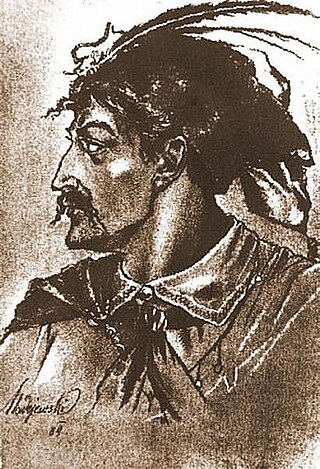Ivan Bohun
Ukrainian Cossack leader (died 1664) From Wikipedia, the free encyclopedia
Ivan Bohun (Ukrainian: Іван Богун) (died 1664) was a Zaporozhian Cossack colonel. A close associate and friend of Bohdan Khmelnytsky, he opposed both the pacts with the Polish–Lithuanian Commonwealth (Treaty of Hadiach of 1658) and with the Tsardom of Russia (Pereiaslav Agreement of 1654).
Ivan Bohun | |
|---|---|
 Portrait by Yan Madeyevskyi in 1884 | |
| Born | Around 1618 Bracław, Bracław Voivodeship, Polish–Lithuanian Commonwealth |
| Died | 17 February 1664 Novhorod-Siverskyi, Starodub Regiment, Cossack Hetmanate |
| Allegiance | Polish–Lithuanian Commonwealth (1640–1648) Zaporozhian Host (1648–1649) Cossack Hetmanate (1649–1664) |
| Years of service | 1640–1664 |
| Rank | Colonel |
| Commands | Mohyliv Regiment Kalnyk Regiment Pavoloch Regiment |
| Battles / wars | |
| Children | Tymofiy Bohun Hryhoriy Bohun |
Biography
Summarize
Perspective
Bohun was born into a Cossack-Ruthenian nobility family.[citation needed] He took part in the Khmelnytsky Uprising against Polish rule in Ukraine. In June 1651 he was elected colonel of troops of Bracław and took part in the Battle of Berestechko against Polish troops led by King John II Casimir Vasa, which the Cossacks lost. Surviving the defeat he regathered his forces and in June 1652 took part in the battle of Batih. In this instance the Cossacks were successful; the Polish commander Marcin Kalinowski was killed and the future hetman Stefan Czarniecki barely escaped with his life.[citation needed] The Polish defeat was complete and allowed the Cossack forces to start a successful offensive and effectively gain control over large parts of the Ukrainian lands. Until 1657 Ivan Bohun also led his forces in minor skirmishes against Polish forces, notably at Bratslav and Uman. He also fought against the Crimean Tatars who had switched sides in the effect of the Treaty of Zboriv of 1649 (they were initially allied with the Cossacks but supported the Commonwealth in later year).

Initially Bohun opposed the Pereiaslav Agreement of 1654. After the Battle of Konotop, Ivan Bohun led an armed pro-Russian uprising against his former ally Ivan Vyhovsky near Konotop and defeated his army in the autumn of 1659.
After being captured by the Poles in 1663, Bohun was offered freedom in exchange for taking part in a new military campaign against the Tsardom of Russia. During the retreat after the disastrous Siege of Hlukhiv Bohun was executed by a firing squad for handing over important military information to the besieged Russian garrison.
Legacy
Ivan Bohun became a popular Ukrainian folk hero, immortalized by Henryk Sienkiewicz in the novel With Fire and Sword, where the character Jurko Bohun was loosely based on him. In the film based on the novel, directed by Jerzy Hoffman, Bohun was played by Aleksandr Domogarov.
Ivan Bohun is also well described in Bohun, a modern, historical novel about Polish-Cossack wars, written by Jacek Komuda.
See also
References
External links
Wikiwand - on
Seamless Wikipedia browsing. On steroids.
